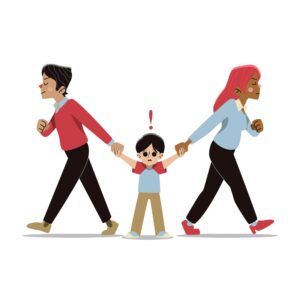TYPES OF MATRIMONIAL DISPUTES
Matrimonial Disputes means family disputes arising out of marriage between husband and wife. Matrimonial Disputes is an umbrella term that includes various aspects of matrimonial disputes between husband and wife.
It includes, Restitution of Conjugal Rights, Child Custody Disputes, Maintenance and Allowance to the wife and child. It also includes Domestic Violence and Cruelty to the wife by husband and his family members leading to a criminal case.
The different topics have been discussed below:
 A Hindu marriage is solemnized in accordance with the Hindu rites and rituals. Hindu Marriage Act 1955 recognizes such marriage as a valid Hindu Marriage. It also recognizes the Saptpadi (where the bride and groom take seven rounds jointly before the sacred fire).
A Hindu marriage is solemnized in accordance with the Hindu rites and rituals. Hindu Marriage Act 1955 recognizes such marriage as a valid Hindu Marriage. It also recognizes the Saptpadi (where the bride and groom take seven rounds jointly before the sacred fire).
As per traditional Hindu rites and rituals, a Hindu Marriage is considered to be a sacred tie between the bride and bridegroom and both their families.
Therefore, at the time of codification of the Hindu Marriage and framing of laws, the legislature kept this in mind and incorporated Section 9 in the Hindu Marriage Act 1955.
This gives a chance to the disputing married couple to solve their problems. To make a genuine endeavour for restitution of their conjugal rights and save their marriage and family.
Restitution of Conjugal Rights as the term itself suggests means restoration of rights relating to marriage.
Therefore, if your husband or wife has left the matrimonial house or separated from you. You can apply before the Family Court of your District for an order directing your spouse to come reside with you and make an endeavour for restitution of conjugal rights.
Even if after getting an order for restitution, your husband or wife does not comes to reside with you, then after one year this in itself becomes a ground for divorce under Section 13 of the Hindu Marriage Act 1955.
 As per Hindu Minority and Guardianship Act, 1956 the natural guardian of boy and an unmarried girl is the father. In the absence of the father, natural guardian is the mother.
As per Hindu Minority and Guardianship Act, 1956 the natural guardian of boy and an unmarried girl is the father. In the absence of the father, natural guardian is the mother.
However, in case of a minor up to the age of 5 years, the custody of the child remains with the mother.
An application for custody of the child can be filed before the Family Court under Guardianship and Wards Act 1890.
The court at the time of appointment of declaration of a person as the guardian of the child, should keep in mind welfare of the child. It is the paramount consideration.
If you file an application before the court, the court has the power to appoint you as guardian of the child’s person, i.e. custody of the child, as well as the property of the child.
You can file an application for custody of the child before the Court where the child or minor ordinarily resides.

In every religion, maintenance of the wife and child as well as elder parents, who are not able to maintain themselves, is considered to be the duty of the husband who has sufficient means.
Your husband must maintain you, your children and his parents, if you are not able to maintain yourself.
Section 125 of the Code of Criminal Procedure 1973 which has been recently changed to Section 144 of the Bharitya Nagarik Surakhsha Sanhita 2023 provides that:
A person who means to maintain his wife, children and parents but refuses to maintain or neglects to maintain any of them.
Then an application can be filed by you before the Magistrate to get an order for monthly maintenance or allowance.
Apart from above, you as a wife can file an application seeking maintenance for yourself and your child under Hindu Marriage Act 1956. Also under Protection of Women from Domestic Violence Act 2005 as an interim measure.
In case, you file two applications, and both the courts direct your husband to give maintenance, then the higher amount of the two is required to be paid by your husband.
 If you have been abused by your in-laws and your husband. If you are subjected to domestic violence and cruelty at their hands.
If you have been abused by your in-laws and your husband. If you are subjected to domestic violence and cruelty at their hands.
Then you are protected by the laws under Protection of Women from Domestic Violence Act 2005 and Section 498A of the Indian Penal Code 1860 now Section 85 of the Bhartiya Nyaya Sanhita 2023.
Under the Indian Penal Code and Bhartiya Nyaya Sanhita, cruelty is defined as a wilful conduct of the husband or in-laws causing grave injury or danger to life and health both mental and physical of a woman and harassment of a woman demanding dowry.
The offence of cruelty is punishable with imprisonment up to 3 years and fine.
Protection of Women from Domestic Violence Act 2005 on the other is an act with the purpose of protecting you immediately.
When you are under threat from your husband or in-laws. You can seek help by filing an application under the 2005 Act. You can seek appropriate compensation against the harassment, cruelty and domestic violence suffered by you. You can also seek immediate protection from them.
VISITATION RIGHTS OF FATHER-REMDEDY UNDER PROTECTION OF WOMEN FROM DOMESTIC VIOLENCE ACT 2005
READ OUR ARTICLE ON EFFECTIVE REMEDIES UNDER PROTECTION OF WOMEN FROM DOMESTIC VIOLENCE ACT 2005